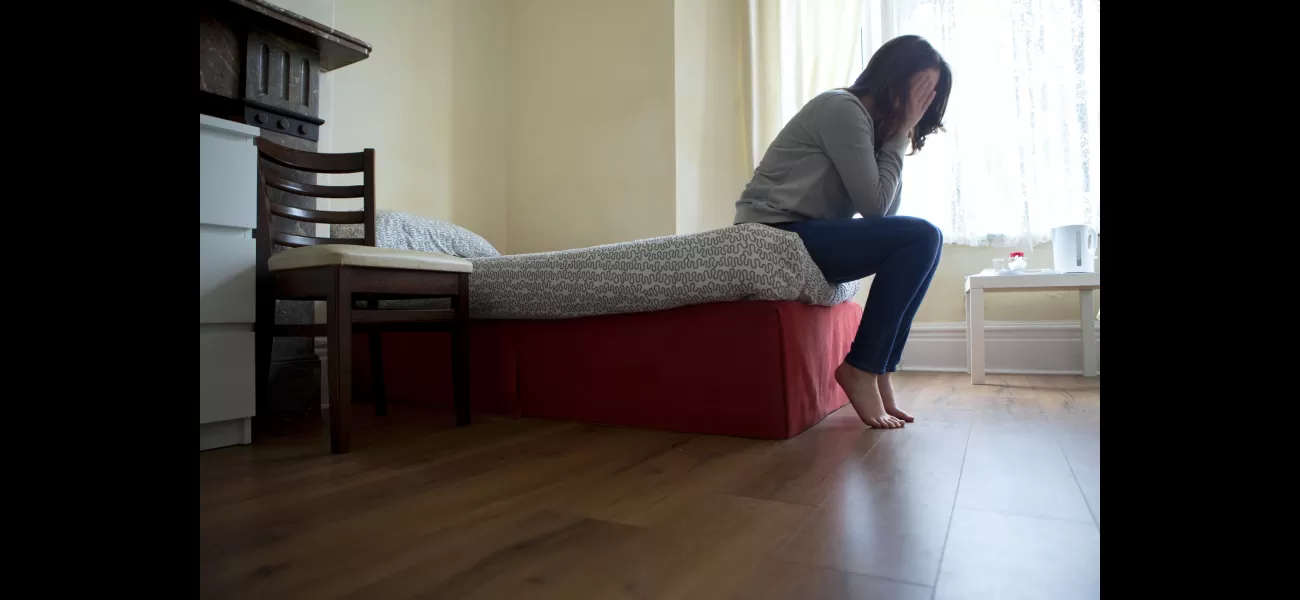My rent was increased by £800, causing my PTSD to flare up.
The housing crisis is unfairly impacting vulnerable individuals, and it must be addressed.
April 9th 2024.

As I reached for my phone on a Saturday morning, still half-asleep in bed, I knew that I was about to face a daunting task. Opening my emails, I saw one from my landlord and my stomach dropped. The familiar feeling of dread washed over me as I read through the emotional blackmail and threats contained within. And then came the final blow - he was planning to take me to court if I didn't vacate the London property within two weeks. It was July 2023, and just three months earlier, he had informed me of a 50% rent increase that I couldn't afford. It seemed like a calculated move on his part.
As a woman living alone with three chronic health conditions and a history of trauma, I knew I couldn't handle this situation any longer. And unfortunately, I'm not alone. Many vulnerable individuals like myself are disproportionately affected by the housing crisis, and it's time for that to change.
My PTSD stems from my work as a youth worker, where I was constantly exposed to gang violence. The worst experience was when a teenage boy was murdered outside the youth center right before my shift started. I was forced to deal with the aftermath, including supporting a group of young girls who had witnessed the tragedy. The fear in their eyes stayed with me, and it's something I'll never forget.
And now, as if that wasn't enough, my landlord was increasing the rent from £1,560 to £2,383 per month. As someone with PTSD, my symptoms can range from dizziness and panic attacks to insomnia and flashbacks. Moving into this flat in 2021 had brought some stability into my life, but now it was being taken away from me. I had managed to find a safe and peaceful area to live in, and even started a new relationship. But all of that was about to be uprooted.
When my landlord called to explain the rent increase, he sounded sheepish and almost ashamed. He blamed it on his own financial struggles, and I sympathized with him. But deep down, we both knew I couldn't afford the new rent. I reached out to my local authority for help, but after several long and personal conversations, they were unable to provide any assistance. And so, as the deadline approached, I had no choice but to follow their advice and stay in the property, ignoring the increase.
But my landlord wasn't satisfied. He threatened me with legal action and put me in a position where I had to fight against someone with more power and resources than me. And this only made my PTSD worse. The symptoms I had been experiencing since hearing about the rent increase escalated, and I found myself back in a state of chronic stress. My GP confirmed that all of my symptoms were stress-related and warned me of the potential for a manic episode. But I was offered no treatment.
After the threatening email, I had no choice but to move out. Thankfully, a friend had a spare room where I could stay temporarily, but the process was overwhelming, especially with my PTSD and chronic pain. It's been a challenging experience, but I am slowly rebuilding and focusing on self-care and therapy.
Unfortunately, I know I'm not the only one going through this. The disabled community is often overlooked and unheard, making it difficult for us to speak up about our struggles. And the solution is simple - we need stable and permanent housing. It's time for vulnerable and disabled individuals to have a voice and be given the support they need.
Do you have a similar story? I'd love to hear from you. Share your thoughts and experiences in the comments below.
As a woman living alone with three chronic health conditions and a history of trauma, I knew I couldn't handle this situation any longer. And unfortunately, I'm not alone. Many vulnerable individuals like myself are disproportionately affected by the housing crisis, and it's time for that to change.
My PTSD stems from my work as a youth worker, where I was constantly exposed to gang violence. The worst experience was when a teenage boy was murdered outside the youth center right before my shift started. I was forced to deal with the aftermath, including supporting a group of young girls who had witnessed the tragedy. The fear in their eyes stayed with me, and it's something I'll never forget.
And now, as if that wasn't enough, my landlord was increasing the rent from £1,560 to £2,383 per month. As someone with PTSD, my symptoms can range from dizziness and panic attacks to insomnia and flashbacks. Moving into this flat in 2021 had brought some stability into my life, but now it was being taken away from me. I had managed to find a safe and peaceful area to live in, and even started a new relationship. But all of that was about to be uprooted.
When my landlord called to explain the rent increase, he sounded sheepish and almost ashamed. He blamed it on his own financial struggles, and I sympathized with him. But deep down, we both knew I couldn't afford the new rent. I reached out to my local authority for help, but after several long and personal conversations, they were unable to provide any assistance. And so, as the deadline approached, I had no choice but to follow their advice and stay in the property, ignoring the increase.
But my landlord wasn't satisfied. He threatened me with legal action and put me in a position where I had to fight against someone with more power and resources than me. And this only made my PTSD worse. The symptoms I had been experiencing since hearing about the rent increase escalated, and I found myself back in a state of chronic stress. My GP confirmed that all of my symptoms were stress-related and warned me of the potential for a manic episode. But I was offered no treatment.
After the threatening email, I had no choice but to move out. Thankfully, a friend had a spare room where I could stay temporarily, but the process was overwhelming, especially with my PTSD and chronic pain. It's been a challenging experience, but I am slowly rebuilding and focusing on self-care and therapy.
Unfortunately, I know I'm not the only one going through this. The disabled community is often overlooked and unheard, making it difficult for us to speak up about our struggles. And the solution is simple - we need stable and permanent housing. It's time for vulnerable and disabled individuals to have a voice and be given the support they need.
Do you have a similar story? I'd love to hear from you. Share your thoughts and experiences in the comments below.
[This article has been trending online recently and has been generated with AI. Your feed is customized.]
[Generative AI is experimental.]
0
0
Submit Comment





